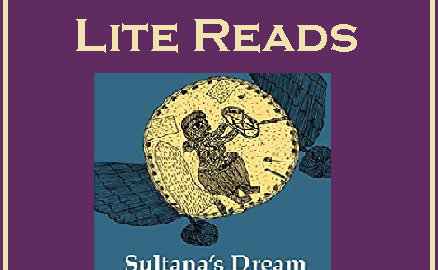We have come to the close of the second week of the Feminist Bibliothecary’s Lite Reads. This week’s selection, announced on August 19, was Sultana’s Dream by Rokeya Sakhawat Hossain. Throughout the week there have been questions as food for thought on social media as people had the chance to read it (whether they read it in their browser, on Serial Reader, or heard it read aloud on Youtube) and think about it. Before I announce the next Lite Reads selection (August 26), I will be sharing my own thoughts right here. Spoilers ahead for those who didn’t have the time to read it this week.
Sultana’s Dream details, you guessed it, a dream Sultana has about a world known as Ladyland. Ladyland is a utopia filled with many of Rokeya Sakhawat Hossain’s own ideas of a utopia, exaggerated to form almost a satirical concept. Both the character Sultana and the author Rokeya Sakhawat Hossain are Muslim women in British India (in the region that is now Bangladesh). This identity really forms the ideas that make up the utopia, fighting back against the oppression of women, but from the context of women oppressed by men claiming it is for the sake of religion.
Sultana is expected to be kept in purdah, away from men she doesn’t know or who aren’t closely related to her, and she is veiled if she leaves the house. The utopian world of Ladyland instead keeps men in a form of purdah. The author uses this role reversal to highlight the injustices of purdah with a sort of wit that points out how absurd the construct is. She even adds a sort of improvement to the notion of it, making the men in Ladyland able to see more distant relatives than the real world allows, as though pointing out that if purdah must exist it could be improved by expanding the circles of those in it.
Like most feminist utopias, Sultana’s Dream points out that if women were given more control (or all control), there would be many improvements to the world. It takes a look at how education, a role in the government, and work at taking care of the people can benefit women, technological advancements, and society at large. The story also keeps a lighthearted tone that indicates the author knows she has taken a small idea to an extreme to make a point, essentially a clever hyperbole to show how the changes in gender roles can make a positive impact.
Sultana’s Dream also has a few science fiction elements, namely the technological developments. Although the story was written in 1905, Rokeya Sakhawat Hossain was able to name solar power and cloud water as ways to advance the technology and society in Ladyland. Using solar power as heat, electricity, and even as a weapon worked well for the story, but also reflected early scientific hopes for the technology. The ability to use cloud water (thereby accessing an unlimited source as well as preventing flooding and storms in the context of the story) isn’t something that many people address today at all, outside of a few companies that purportedly sell cloud water. This makes Sultana’s Dream one of the earliest examples of science fiction literature in the Indian subcontinent.
I think that Sultana’s Dream has the ability today to really change the thought process of western readers. Science fiction, utopian literature, and feminism are all things that most western readers wouldn’t necessarily associate with India or Bangladesh, especially regarding works written in the early twentieth century. When we think of first wave feminism, many people do not think outside of the USA or the UK (and maybe western Europe, Canada, Australia, depending upon the individual). I think it’s important that we read the literary canon of first wave feminism outside the western world. I also think it’s important that we look outside the western world in general when it comes to classic literature.
Overall, I really enjoyed this story. The plot was a simple utopian world shown through a dream, but overall it is insightful, humorous, clever. With a unique outlook on feminism, religion, education, and technology, Sultana’s Dream is able to shed light on things often left in darkness. Rokeya Sakhawat Hossain made an impact, and everyone should know this.
I hope everyone who participated by reading the story and following along on social media enjoyed themselves. If you have more thoughts to add, please feel free to comment on this post, or anywhere on The Feminist Bibliothecary’s social media. Week three begins tomorrow, August 26, with a brand new short story selection!

1 thought on “Lite Reads Review: ‘Sultana’s Dream’ by Rokeya Sakhawat Hossain’”